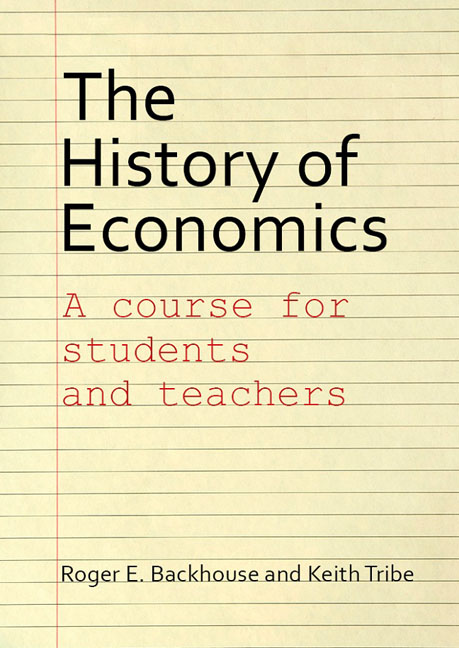Book contents
- Frontmatter
- Contents
- Introduction
- Lecture 1 Commerce, Wealth and Power: The Disputed Foundations of the Strength of a Nation
- Lecture 2 Natural Order, Physiocracy and Reform
- Lecture 3 Adam Smith I: Outline of a Project
- Lecture 4 Adam Smith II: The Two Texts
- Lecture 5 The Political Economy of Malthus and Ricardo
- Lecture 6 Political Economy in Continental Europe and the United States
- Lecture 7 Political Economy, Philosophic Radicalism and John Stuart Mill
- Lecture 8 Popular Political Economy: List, Carey, Bastiat and George
- Lecture 9 Radical Political Economy: Marx and His Sources
- Lecture 10 Marginalism and Subjectivism: Jevons and Edgeworth
- Lecture 11 From Political Economy to Economics
- Lecture 12 Alfred Marshall’s Project
- Lecture 13 Markets and Welfare after Marshall
- Lecture 14 Monetary Economics
- Lecture 15 The Rise of Mathematical Economics
- Lecture 16 Robbins’s Essay and the Definition of Economics
- Lecture 17 John Maynard Keynes
- Lecture 18 Quantitative Economics
- Lecture 19 The Keynesian Revolution
- Lecture 20 Modern Macroeconomics
- Lecture 21 Inflation and the Phillips Curve
- Lecture 22 Popular Economics
- Lecture 23 Economics and Policy
- Lecture 24 Ideology and Place
- Index
Lecture 13 - Markets and Welfare after Marshall
Published online by Cambridge University Press: 09 August 2023
- Frontmatter
- Contents
- Introduction
- Lecture 1 Commerce, Wealth and Power: The Disputed Foundations of the Strength of a Nation
- Lecture 2 Natural Order, Physiocracy and Reform
- Lecture 3 Adam Smith I: Outline of a Project
- Lecture 4 Adam Smith II: The Two Texts
- Lecture 5 The Political Economy of Malthus and Ricardo
- Lecture 6 Political Economy in Continental Europe and the United States
- Lecture 7 Political Economy, Philosophic Radicalism and John Stuart Mill
- Lecture 8 Popular Political Economy: List, Carey, Bastiat and George
- Lecture 9 Radical Political Economy: Marx and His Sources
- Lecture 10 Marginalism and Subjectivism: Jevons and Edgeworth
- Lecture 11 From Political Economy to Economics
- Lecture 12 Alfred Marshall’s Project
- Lecture 13 Markets and Welfare after Marshall
- Lecture 14 Monetary Economics
- Lecture 15 The Rise of Mathematical Economics
- Lecture 16 Robbins’s Essay and the Definition of Economics
- Lecture 17 John Maynard Keynes
- Lecture 18 Quantitative Economics
- Lecture 19 The Keynesian Revolution
- Lecture 20 Modern Macroeconomics
- Lecture 21 Inflation and the Phillips Curve
- Lecture 22 Popular Economics
- Lecture 23 Economics and Policy
- Lecture 24 Ideology and Place
- Index
Summary
Aims of the lecture
1. To explain what happened to ideas about markets, the firm and welfare after Marshall.
2. To distinguish between British and American approaches to problems of markets and industrial structure, relating that discussion to the different histories of the two countries.
3. To provide the context for discussions of Lionel Robbins and the rise of mathematical economics that come in later lectures.
Bibliography
The following books are the key texts discussed in this lecture, in varying levels of detail. The first four deal with the theory of the firm, while the last three deal with welfare economics: F. H. Knight, Risk, Uncertainty and Profit (Boston, MA: Houghton Mifflin, 1921); J. M. Clark, The Economics of Overhead Costs (Chicago, IL: University of Chicago Press, 1923); E. H. Chamberlin, The Theory of Monopolistic Competition (Cambridge, MA: Harvard University Press, 1933); J. Robinson, Economics of Imperfect Competition (London: Macmillan, 1933); A. C. Pigou, Wealth and Welfare (London: Macmillan, 1912); A. C. Pigou, The Economics of Welfare, four editions (London: Macmillan, 1920–32); and J. A. Hobson, Work and Wealth (London: Macmillan, 1914).
M. Morgan’s “Competing Notions of ‘Competition’ in Late Nineteenth-Century American Economics”, History of Political Economy 25 (1993), 563–604, discusses the variety of approaches to competition found in late-nineteenth-century American economics, making clear the contrast with British approaches to the subject.
N. Aslanbeigui and G. Oakes’s Arthur Cecil Pigou (London: Macmillan, 2015) is an account of Pigou’s economics that goes into far greater depth on both his theory of economic policy and his position in the cost controversy than is possible here.
I. Kumekawa’s The First Serious Optimist: A. C. Pigou and the Birth of Welfare Economics (Princeton, NJ: Princeton University Press, 2017) is a very new biography of Pigou (published too late to be taken into account in writing this lecture) that nicely complements the previous account of Pigou’s work.
E. H. Chamberlin’s “The Origin and Early Development of Monopolistic Competition Theory”, Quarterly Journal of Economics 75 (1961), 515–43, is a retrospective account of the origins of Chamberlin’s own theory, making clear the differences between himself on the one hand, and Robinson and participants in the British cost controversy on the other.
- Type
- Chapter
- Information
- The History of EconomicsA Course for Students and Teachers, pp. 199 - 214Publisher: Agenda PublishingPrint publication year: 2017

